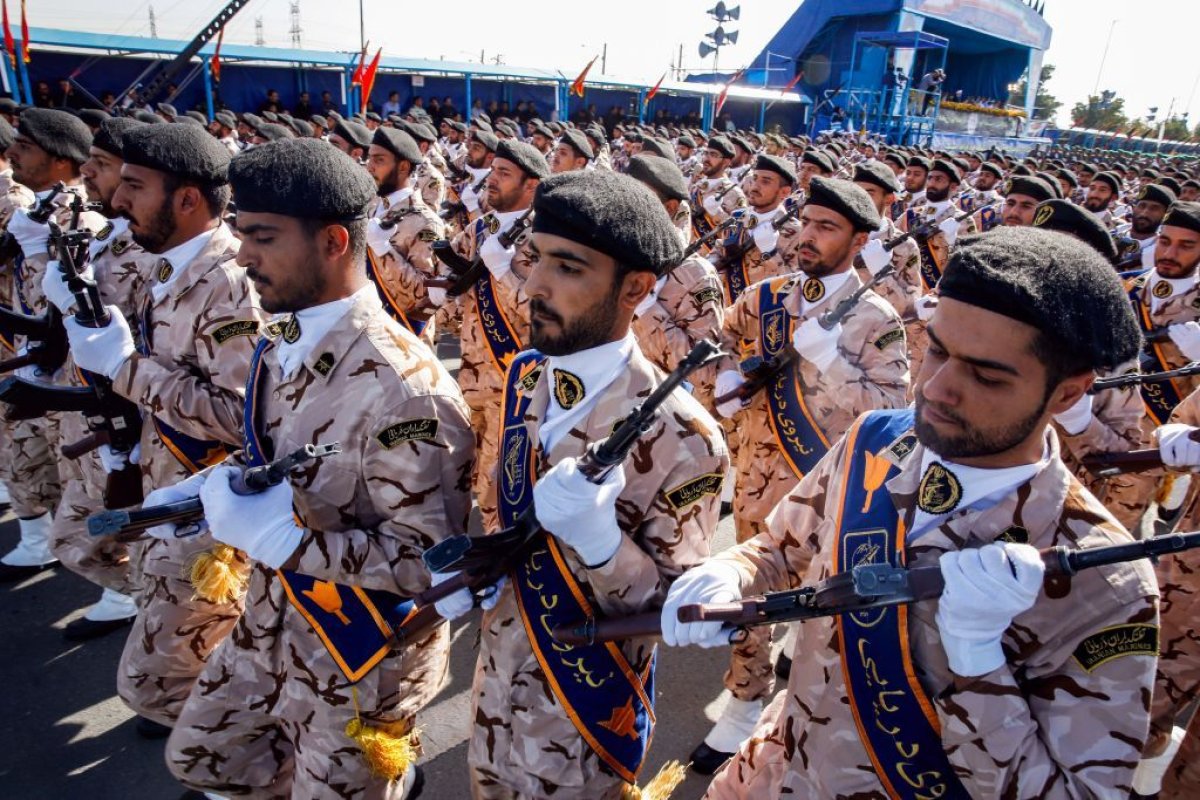President Donald Trump on Monday confirmed that the U.S. would officially designate Iran's Islamic Revolutionary Guard Corps (IRGC) as a "terrorist organization."
The IRGC is an elite force within the Iranian military. Washington had previously blacklisted numerous affiliated groups and organizations, but the IRGC itself had never been officially deemed a terrorist group.
The IRGC was founded in 1979 following the country's revolution, which overthrew U.S.-backed Shah Mohammad Reza Pahlavi, who had governed since 1941. It has since operated as an elite force within Iran's Armed Forces. In recent years, the military organization has been involved in regional conflicts, such as in Syria, training and supporting forces that Iran backs.
Iran's ballistic missile and nuclear programs are managed by the IRGC, and Iran has said it possesses missiles with a range of up to 1,242 miles. With that range, the Islamic Republic could target U.S. ally Israel as well as U.S. military bases. Iran has long threatened Israel, with hard-liners regularly recommending that the regional rival be annihilated.
The Trump administration also accused the IRGC of being behind terrorist attacks and plots dating back to the 1996 Khobar Towers bombing in Saudi Arabia that left 19 American citizens dead. The administration pointed to foiled plots and plans that were uncovered targeting countries in Africa and Europe.
The use of terrorism is central to the Iranian regime’s foreign policy. The designation of IRGC, incl. Qods Force, will help starve the regime of the means to execute this destructive policy. Maximum pressure will be unrelenting until Iran’s regime abandons its deadly ambitions.
— Secretary Pompeo (@SecPompeo) April 8, 2019
Trump said the new designation "makes crystal clear the risks of conducting business with, or providing support to, the IRGC... If you are doing business with the IRGC, you will be bankrolling terrorism." Secretary of State Mike Pompeo said the decision would go into effect by April 15.
After that, it will be illegal for any U.S. citizen or resident to provide "material support or resources" to members of the Iranian military organization. Under the broad designation, anyone with connections to the group will also be denied visas to the U.S. or will have their current visa taken away.
Iran was quick to condemn the Trump administration's decision. "Although the Islamic Republic of Iran has not and is not after tension, it will reciprocate [the move] if the U.S. makes such a decision," Iranian Foreign Minister Javad Zarif was quoted as saying earlier Monday by Iran's Fars News Agency.
"If [the Americans] make such a stupid move, the U.S. Army and American security forces stationed in West Asia [Middle-East] will lose their current status of ease and serenity," Iranian Major General Mohammed Ali Jafari had warned ahead of the expected announcement, according to Fars.
Jacob Shapiro, director of analysis at Geopolitical Futures, told Newsweek that while the designation was severe, it was more of the same from the Trump administration, which has taken a consistently tough stance against Iran.
"Legally, there are some interesting questions raised about what it means for a state government, the U.S., labeling another state organization, IRGC, a terrorist group—but practically, Iran has known for years now that the U.S. is hostile to its ambitions in the region," Shapiro explained.
"There is not a whole lot Iran can do about this," he added, positing that Iran would likely continue acting in the same manner. If anything, Shapiro said, the decision would encourage Iran to escalate its actions that challenge Washington.
"I wouldn't be at all surprised if they go back to developing a nuclear deterrent," he said.

Trump withdrew the U.S. from the 2015 Joint Comprehensive Plan of Action (JCPOA)—commonly known as the Iran nuclear deal—last year, and re-implemented punitive sanctions on Iran. The decision was opposed by the agreement's other signatories (the U.K., France, Germany, the EU, China and Russia), as the United Nations nuclear watchdog consistently found that Iran remained in compliance with the treaty. Earlier this year, Trump-appointed leaders of the intelligence community said the 2015 deal had effectively curbed Iran's nuclear ambitions. The president then criticized the intelligence community members, saying they should "go back to school."
Top officials from the CIA and the Pentagon reportedly oppose the Trump administration's decision to designate the IRGC as a terrorist group, according to The New York Times. They believe it will encourage Iranian hard-liners to take an even harsher stance against the U.S. while building their base of support. Conservative elements within the Iranian regime could use this designation to justify attacks against the U.S. or the forces it supports within the region.
The move could also complicate U.S. foreign policy, as regional American allies such as Iraq and Lebanon maintain positive ties with Iran. Politicians and military officials in each country meet routinely with leaders of the IRGC regarding regional security issues.
Uncommon Knowledge
Newsweek is committed to challenging conventional wisdom and finding connections in the search for common ground.
Newsweek is committed to challenging conventional wisdom and finding connections in the search for common ground.
About the writer
Jason Lemon is a Weekend Editor at Newsweek based in Brooklyn, New York. Prior to taking on the editor role, Jason's reporting focused on ... Read more
To read how Newsweek uses AI as a newsroom tool, Click here.








